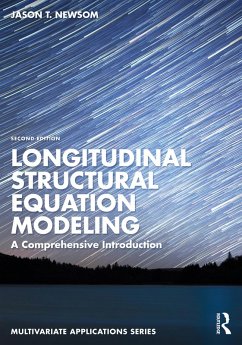This accessibly written book explores a range of models, from basic to sophisticated, including the statistical and conceptual underpinnings that are the building blocks of the analyses. By exploring connections between models, it demonstrates how SEM is related to other longitudinal data techniques and shows when to choose one analysis over another. Newsom emphasizes concepts and practical guidance for applied research rather than focusing on mathematical proofs, and new terms are highlighted and defined in the glossary. Figures are included for every model along with detailed discussions of model specification and implementation issues and each chapter also includes examples of each model type, descriptions of model extensions, comment sections that provide practical guidance, and recommended readings.
Expanded with new and updated material, this edition includes many recent developments, a new chapter on growth mixture modeling, and new examples. Ideal for graduate courses on longitudinal (data) analysis, advanced SEM, longitudinal SEM, and/or advanced data (quantitative) analysis taught in the behavioral, social, and health sciences, this new edition will continue to appeal to researchers in these fields.
Dieser Download kann aus rechtlichen Gründen nur mit Rechnungsadresse in A, B, BG, CY, CZ, D, DK, EW, E, FIN, F, GR, HR, H, IRL, I, LT, L, LR, M, NL, PL, P, R, S, SLO, SK ausgeliefert werden.
Ronald H. Heck, University of Hawaii
"This book offers a schematic, comprehensive, and well-structured resource for understanding, applying, and teaching most of the techniques related to Longitudinal SEM. The book follows a specific flow based on the difficulties of the topics. It starts with a clear introduction to latent variable modeling, then moves on widely used longitudinal applications (e.g., measurement invariance, cross-lagged panel models), and finally offers chapters on more advanced and recent topics (e.g., LST, Mixture Modeling, and DSEM). The structure of the book also allows the reader to directly access the topics of interest. Both from an applied and teaching perspective, it is difficult to think of a more complete and better structured book on longitudinal SEM."
Enrico Perinelli, University of Trento (Italy)
"I've cited Jason Newsom's first edition of Longitudinal Structural Equation Modeling many times, and his second edition continues the tradition of clear, accessible presentations that cover both the basics of analysis and modeling strategies for longitudinal data and extra details that experts would appreciate. An impressive, authoritative work."
Rex Kline, Concordia University


